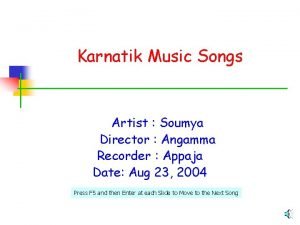Cover Songs and Copyright Law A Sri Lankan







- Slides: 7

Cover Songs and Copyright Law: A Sri Lankan case study By Dr Gowri Nanayakkara Senior Lecturer in Law Canterbury Christ Church University

Covering as an issue • Common view - A song can only be performed by the singer who performed the base song. • Cover songs of Indian and Western songs are quite common • Contestations relating to covering Sinhala songs by other vocalists is widely visible • Historical, economic and moral reasons are visible within such contestations.

Copyright Law Intellectual Property Copyright Neighbouring Rights PRR

Rights in a song Song Lyrics Lyricist/Author Music composer/Auth or Performance Singer/Perform er

A copyright paradox • Covering under copyright law • Allowed subject to licensing • Common in many jurisdictions in the world • Covering Sinhala songs in the local music industry • Contested by the singers • Not very common • Some changes are visible albeit with hesitations

Performing As belonging • Singer provides meaning to an experience articulated in the authors’ text. • Mark Slobin: ‘music allows the simultaneous projecting and dissolving of the self in performance’ Subculture Sounds. Micromusic of the West (Wesleyan University Press 1993) • Simon Frith: Listeners also immerse themselves in music as it has the ability to move from performing to listening and listening to performing’ Simon Frith, ‘Music and Identity’ (Sage 1996)

Proprietary foundations for creativity? • Copyright based on proprietary foundations • Ignores collective aesthetic practice in music and its unique qualities that facilitate such practices • Concealed/ignored the ability to create a sense of belonging through performance. • Belonging provides broader space to discuss, understand facilitate music practices such as covering













